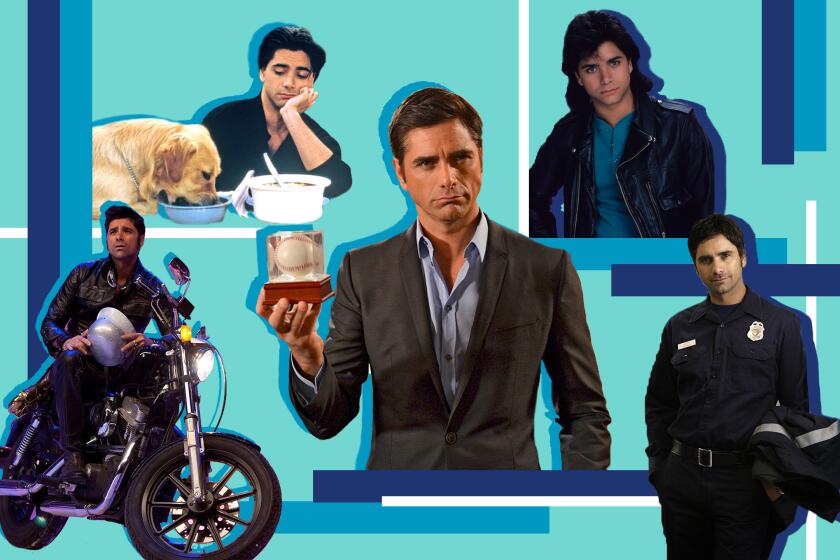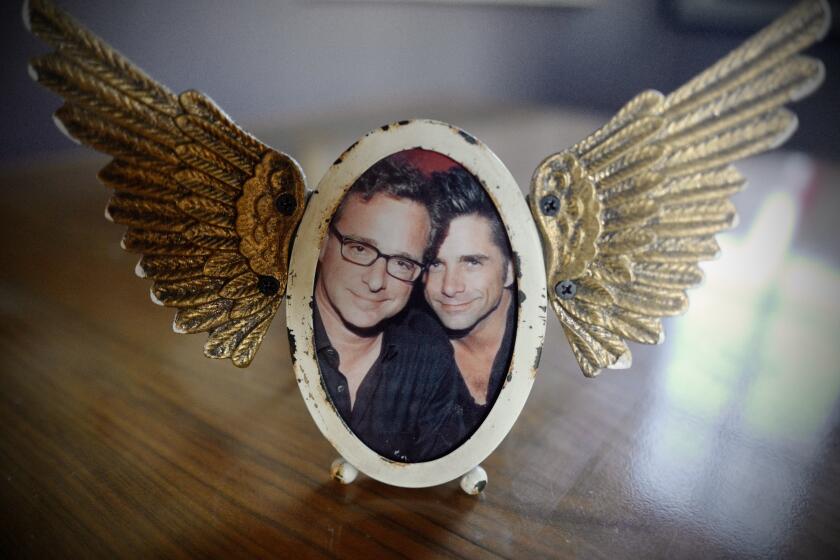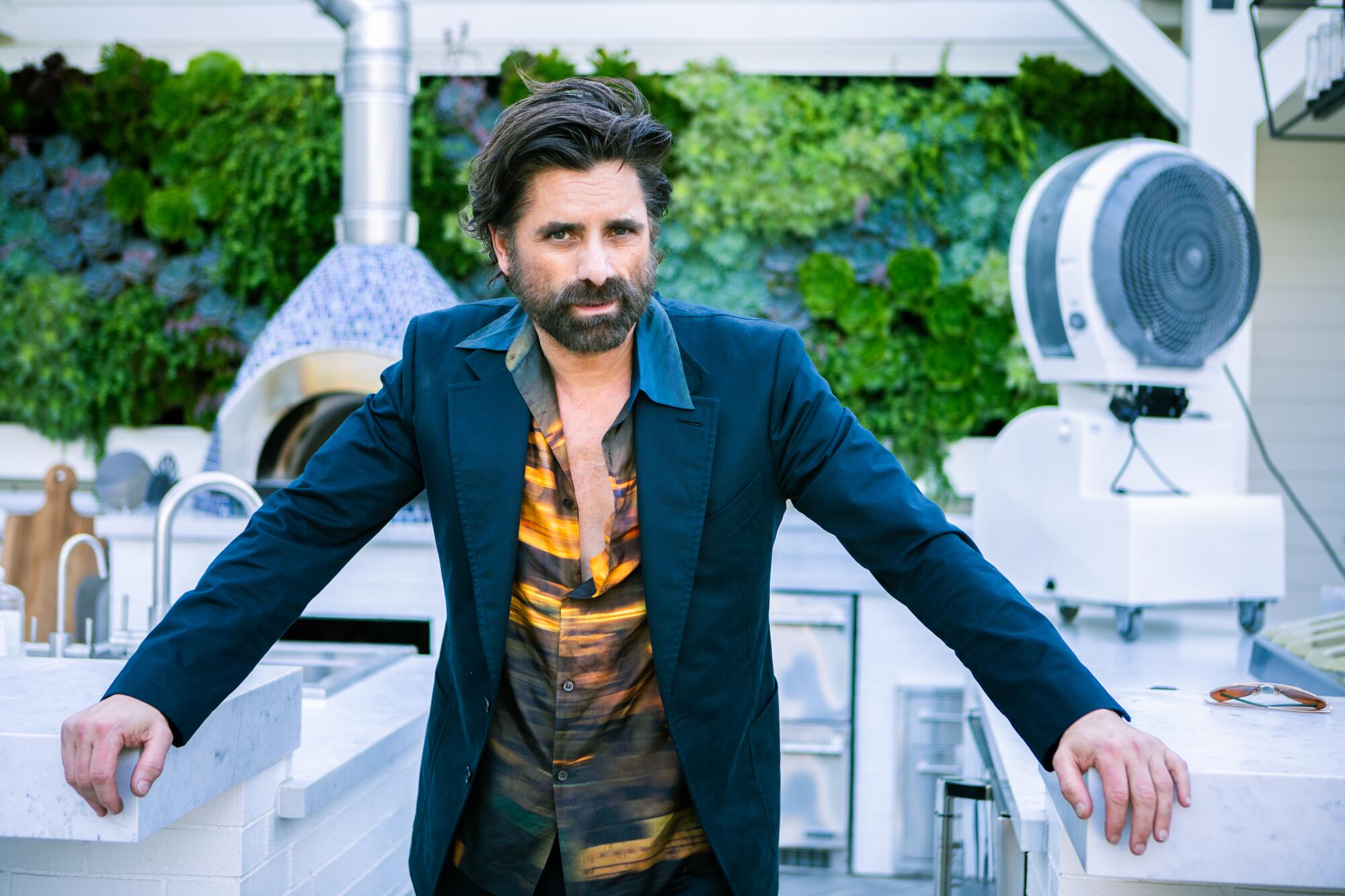
- Share via
In June 2021, I wrote an essay for this paper that began, “I have come to understand that I have a thing for John Stamos.” I had been watching him in the wonderful Disney+ series “Big Shot,” in which he plays Marvyn Korn, a temperamental college basketball coach who finds himself demoted — though, in a human sense, promoted — to coaching high school girls. And I realized that I had for some time been enjoying his work, which felt committed and natural and elevated whatever show he was on. You do not act for 40 years in Hollywood without having something special, without being good at what you do.
The piece came as a surprise, even a shock, to the subject, who sent a sweet note, imagining his parents’ reactions: “I would have loved to have seen the look on my dad’s face at 6 a.m. reading his Los Angeles Times front to back at our kitchen table, smoking a long thin More cigarette, as he read your story about his son. His chest would swell to about 60 inches, and he would say: ‘Well, the guy went a little overboard, but most of it is true’ (always kept me humble), and my mother would just cry.”
“Big Shot” returned for a second season Wednesday, quality still high, and it was nearly inevitable that the following interview would take place. We had exchanged some emails — Stamos sometimes performs with the Beach Boys, for whom my father once worked, and we had some mutual interests and acquaintances. And he allowed The Times to publish his funny, lovely eulogy for his longtime friend Bob Saget. But this was the first time we talked, over Zoom.
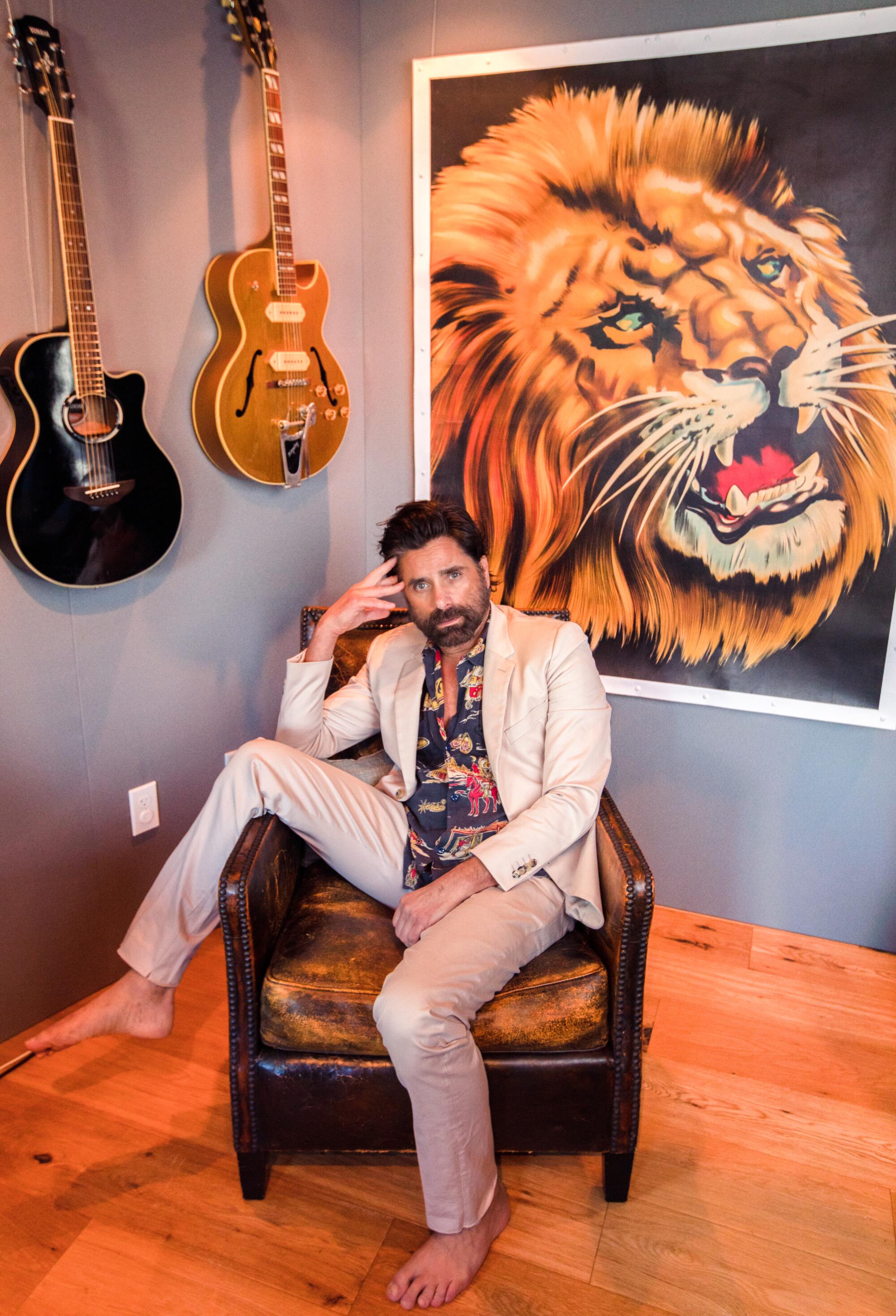
At one point, wife Caitlin McHugh came through the room before heading out to Disneyland with their 4-year-old son, Billy. Stamos, who grew up in Orange County near the park, is famously a Disney nut, and it naturally played a part in their courtship.
“We started going out, and one of the first big things we did was go to Disney World,” he recalled. “We were in Epcot, and I had a hat and glasses, walking around. I was like, ‘Nobody’s recognizing me. I’ve got to impress this girl with my fame.’ So I take my glasses off and try to make eye contact with people, like a weirdo. And she’s catching it a little bit. Then I take my hat off — I have famous hair. I’m, like, doing catchphrases. ‘Have mercy!’ And she said, ‘What are you doing?’ I said, ‘Oh, nothing.’ She said, ‘You’re trying to get recognized aren’t you?’ I said, ‘Noooo, why would I do that?’ So now the term is ‘Epcot-ing,’ if she ever catches me trying to get recognized.”
Here is the rest of our conversation, edited for clarity and length.
With “Big Shot,” on Disney+, the “Full House” veteran has found the perfect part in a lovely show. Perhaps the Stamossance is already here.
Did you want kids a long time?
I did. I had to sober up, 7 1/2 years ago. I remember too, around that time, looking in a mirror and going, “Who have I turned into? I’m not the person my parents raised.” My mom had just died, [then] I got a DUI. And it plays tricks on you, this disease, and you go, “You’re fine.” And I remember also pretty clearly saying I didn’t care if I died. I didn’t want to die. But I was like, “I’ve done everything, what else am I going to do?” What a stupid thing that was to say; I hadn’t done it all, and I still have so much to do. I felt the universe wanting to be on my side, but I was confusing the universe for a long time. So I straightened out — and probably my mom dying had something to do with it. I know she’s up there right now, and Bob’s talking her ear off.
When you were in the midst of your low years, how did your parents deal with that?
Well, my dad was gone. And my mom and I became very, very close. I got a divorce [from Rebecca Romijn] pretty close to my dad dying, and we both had gigantic holes in our hearts and our souls. So it was, I think, a healthy codependent relationship. My dad was the only man she ever loved. She lived in Orange County, and I would go down almost every weekend and stay with her; she called it the Castle of Comfort. It got to a point where it might have been hampering me from meeting someone, ‘cause when I was lonely, I was depressed, I was upset, I’d just go down to my mother’s house, which is where I grew up, and be surrounded by that love which was always there, and all the old stuff. She kept everything down to my tonsils.
Had you always wanted to be an actor or was it a whim that suddenly turned into a career?
I wanted to be famous first. I didn’t think that people liked me. I was the gawky, weird — everybody says, “I was such a nerd,” but I really was. But when I looked back recently at my old yearbooks, people were really nice: “You’re going to make it,” “See you in Hollywood.” So I think I always had it on my radar. My parents said, “You want to do it, do it. Just work your ass off, be a good guy, be disciplined.”
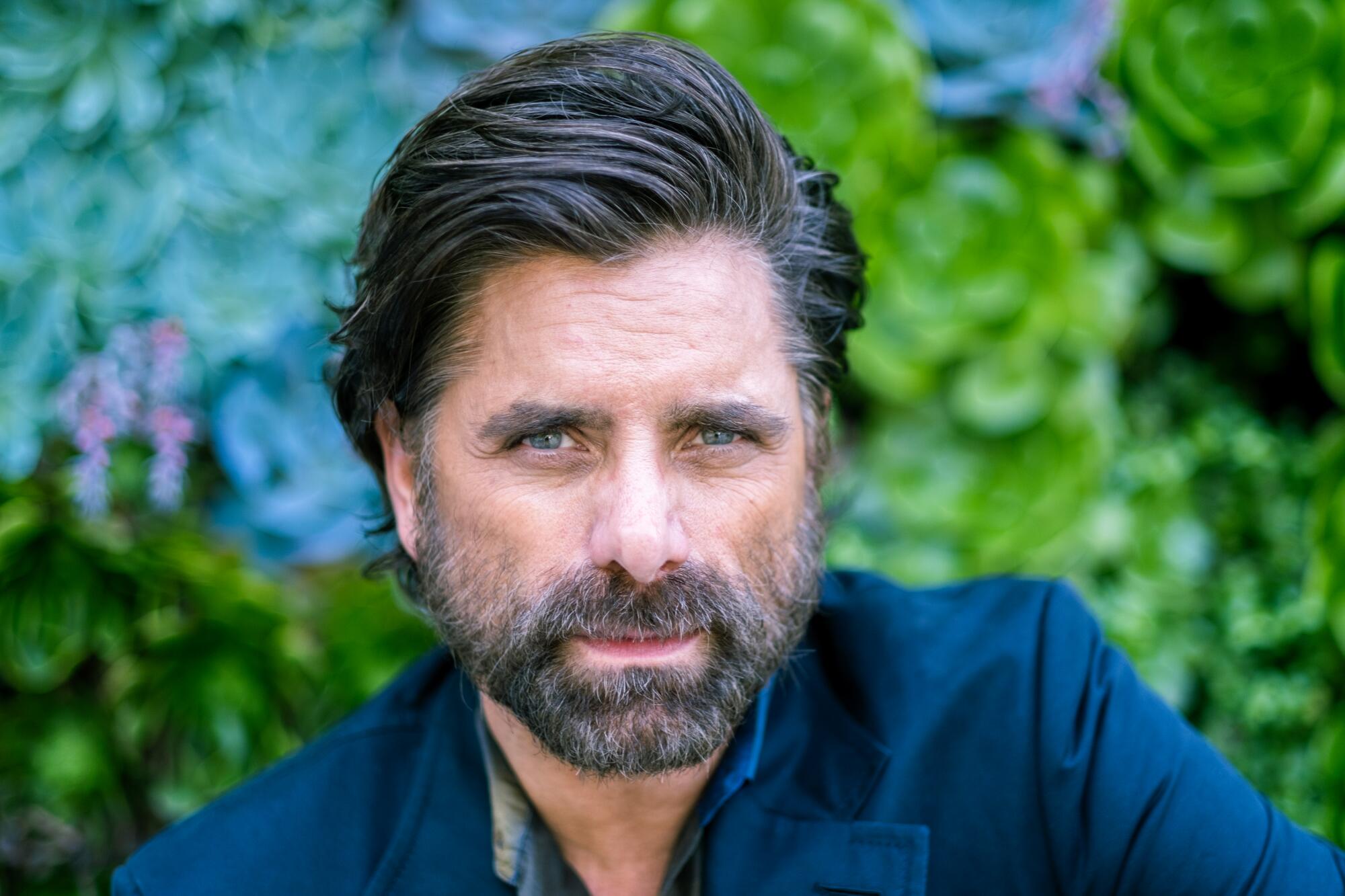
What did you learn working in your father’s restaurants?
Watching my dad, the way he treated people, stuck with me. He treated the busboy the same way he treated his best customer. I think part of my longevity is just being nice to people, but not because, “Oh, I’ve got to be nice to this person.” I just like people. I like to ask questions. I try to learn everyone’s name on the set the first day or two. I’m truly interested. I ask everybody about their families, where they grew up, try to find some connection. And then discipline for sure. He was like, “If you’re five minutes early, you’re 10 minutes late.” My dad wanted me to go to college to learn business. He was grooming me to take over the hamburger joints; he had three, Duke’s, Yellow Basket and Burger Basket. Cypress College was right down the road, and I know it sounds stupid, but I was right on the edge of being truly coddled by my mother, and when I started to do things on my own I was a bit lost. I was going to sign up for college, but I couldn’t find the sign-up room. So I was like, “Oh, f— it.” And my dad was, “Next semester you have to go and that’s that.” And I was like, “I gotta get on TV.” And then I got “General Hospital.”
I wanted to be famous — getting back to that and my friend Mike Owen, we would go to Disneyland or Knott’s Berry Farm and he would run up to me and ask me for my autograph, and everybody was like, “Who’s that?” and I’d sign autographs. Later in life, I was like, “Oh, wait, this is a craft, I’d better learn, I’d better be good at it.” And I did fall in love with that part of it.
Stamos reflects on more than 35 years of friendship with his beloved ‘Full House’ co-star, who died Jan. 9 at 65.
I know you played in marching band in high school. Did you also play in a garage band?
For sure. My first band was called Destiny with two brothers who I’m still friends with today. And then I played in this band called Crosswinds, I think, in high school, and the bass player, she had a sister. After one rehearsal, I was about 17, we were rehearsing at her house down the street from my house. And the older sister was just this goddess. So rehearsal’s over — “Everybody go home. Not you,” she said. And that’s when I lost my virginity. It was like, “I like it.” At first, actually, to be honest, it was like, “This is what the whole world revolves around?” And I was very immature, I was very just naive and simple. [I saw her] a couple of weeks ago. I go, “How was that?” She said I was a gentleman.
What were the Tiger Beat teen idol days like for you?
It’s a machine — I want to do a show about it. It’s predators and prey and sort of a factory. There was a woman named Doreen Lioy [an editor at Tiger Beat], and even before I was on “General Hospital,” somehow I met her, and she later said, “I saw something in him that captivated me.” And she had no family and became very close to my mother and was at our house for holidays. And then I got on “General Hospital,” and she really took me under her wing. And we stayed friends. A few years later, she was hanging out in the courtroom watching the trial of Richard Ramirez [the serial killer known as the Night Stalker], and she marries him in jail and says in an article, “I saw something that captivated me.” My hand to God.
On “General Hospital” I had a two-year contract, 30 million people were watching, it became a gigantic thing. I wanted to leave at the end of my deal, and they kept throwing more money at me. [Producer] Gloria Monty, it was my 20th birthday, she said, “Let’s go celebrate your birthday, dear.” I knew it wasn’t about my birthday. So we go to La Famiglia and over there is Dean Martin, and he’s sitting there with this giant glass at a table set for two — it was his way of keeping people from coming around sitting with him. And Gloria said, “So why do you want to leave now?” I said, “Well, I want to be funny, I want to be on a sitcom, like ‘Happy Days.’” And she said, “You know, you’ll never work in this town again if you leave the show.” And I said, “I think I will. I probably will.” And I just had this picture of being in a Mafia Italian joint and all the waiters getting their guns out, and Gloria hits the floor, Dean hits the floor, and they just take me out.
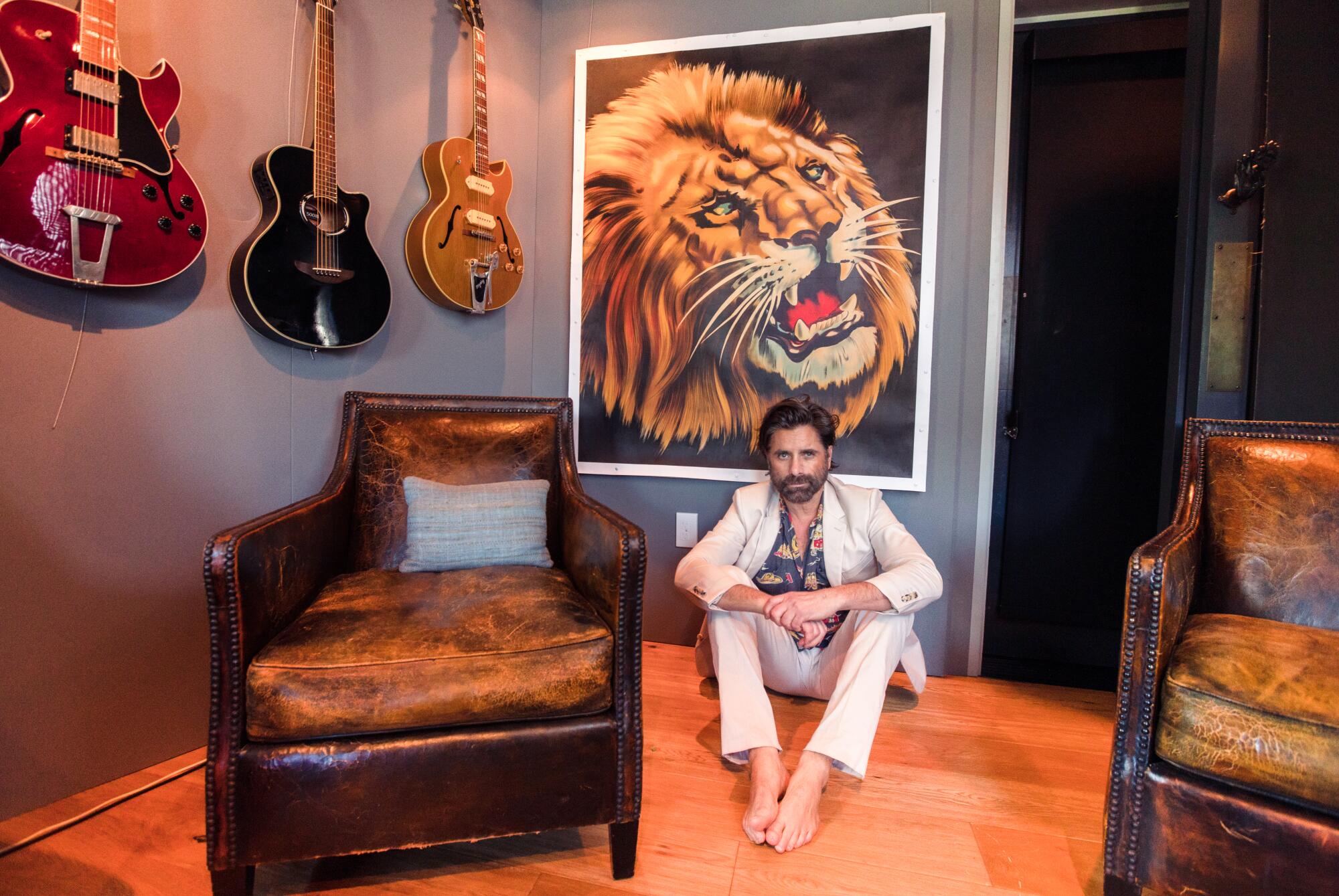
Given your life trajectory, do you see yourself in any of the late-maturing characters you’ve played as an adult?
The type of guys I usually play, sometimes they don’t start out like that, but they kind of veer that way. I’m glad I’m out of that “Peter Pan” syndrome. There’s a lot of things about being an adult that suck. And I have the whole world saying, “You look so young!” But I was not achieving what I wanted, I didn’t have a family, I wasn’t settled. I think people had a perception of me that wasn’t me. I know it. I always wanted to be in a relationship. I always went to bed really early, so that saved me from trouble. I’d go on these shows — Howard Stern, Jimmy Kimmel —they’d be like, “Oh, man, you must have a million girls.” “Yeah, a million two.” And I’d go home alone. But it was an image that was out there and I thought, “I’d better play into this because what else do I have?” But I wasn’t that guy, and that kind of guy is not really in fashion now. It’s not cute anymore. It’s not cute on TV. It’s not cute in real life.
As a Disney superfan, did getting on a Disney+ show feel fulfilling?
I loved that I was part of the beginning of Disney+. If I weren’t there, I’d be like, “I want to get on Disney+.”
“Big Shot” was not getting picked up after last year. We were on episode eight or nine out of 10, and I remember saying, “Let’s just pick the show up now, we’ll take a month off, write new scripts, ‘cause the girls are going to get old.” They’re like, “Let it air first.” It comes out, it does whatever. I said, “Will you pick it up now?” “Well, let’s see a few more shows.” Weeks go by and weeks go by; all 10 come out. So I start calling around. It’s like, “Well, it didn’t do well in India, because they don’t play basketball” — all these analytics and graphs and charts. They know when you turn it on, when you turn it off, when you take a pee, how long the pee was, did you come back after the pee. Once there were the Brandon Tartikoffs [television executive], and these guys who would pick stuff up from their heart. And so I was waiting for that: “Where’s Disney? You guys are about heart.”
I said to myself, “John, take the hit, it’s not coming back.” And then in one of the corniest moments of my life, I go, “Wait a minute — what would Coach Korn do here? Can I look in the mirror and say I did everything I could to get this show picked up?” And Peter Rice [then-chairman of Walt Disney Television] lives down the street from me, so I emailed him, “Do you want to take a walk around the neighborhood?” And I poured my heart out about what the show meant to me. Plus, here’s a show with a 98% diverse female cast. In its DNA it’s about female empowerment. We need these kind of shows. That was on a Thursday; Friday I get this call from the studio, and I didn’t answer because I knew it was going to be bad. And they called [co-creators] David Kelley and Dean Lorey and said, “Sorry, it’s done. We tried.” And then an hour later they called back and said, “Hold on. Apparently John Stamos took a walk with Peter Rice? And Peter told us to try to find the money for it.”
The show is half an hour this year, instead of an hour, but it does feel more focused.
It was getting too light. I was like, “Let’s get back to the stuff with [Korn’s] daughter” — Sophia [Mitri Schloss] is one of the best actresses I’ve ever worked with. Let’s get edgier, let’s get deeper, ‘cause this is the show I signed up to do. When Bob died, one of the things that broke my heart the most was that there was a tsunami of love for him, but he didn’t see it. I know he didn’t realize how loved he was. He was very insecure. He wasn’t where he wanted to be in his career. So I said, “What if one of Korn’s friends turned out to be [his old coach], who starts worrying about his legacy, what he’ll leave behind?” It really feels good to have ideas and see them come to fruition; I’ll do notes on something, and they turn out to be pretty good. Jack Klugman used to make me, on our sitcom [“You Again?” from 1986], they would have punch-up night — it was Garry Marshall, Jerry Belson, Harvey Miller, a lot of guys from “The Odd Couple” — he’d say, “Sit in the corner, don’t say a word, just listen.” And I’d watch the structure of jokes and story, and it always stayed with me.
On “General Hospital,” they’d say “Go home, John,” and call me “The Sponge,” but I wanted to soak it all up. I was always the youngest guy on the set, and I gravitated toward Jack Klugman, Garry Marshall, Don Rickles, who was my guy for so many years. And now I’m that guy, and I wear that with honor, to honor the good influences that I had. I’m pretty close to all the girls. We text, we talk, we call. They’re all good kids, there’s no prima donnas. I just implore them to listen and learn. It doesn’t have to be from me, but just keep your eyes open. I remember last season they were supposed to work ‘til 6 or something; they got off at 3. “Oh you got off early?” “Yeah!” “Where do you have to be better than this? What are you so excited about, being done? Your whole life you wanted to be an actress, and here you are working on a big show. What’s better than this?”
More to Read
The complete guide to home viewing
Get Screen Gab for everything about the TV shows and streaming movies everyone’s talking about.
You may occasionally receive promotional content from the Los Angeles Times.
